Jean-Marie Dubois stood on the charred remains of his terrace looking out over the valley. The once verdant hillside was now a ghostly grey, save for the black skeletons of burnt pine trees. In the foreground, his vineyard had been scorched to a deep tobacco brown. “We’ve lost everything,” he said.
He and his wife had been on holiday in Sardinia last week when their son called. “He told me ‘Papa, there’s a big fire … and it’s coming towards the house,’” recalled Dubois, a vigneron, or winemaker — but also a professional fireman who has spent his career braced for the threat of summer wildfires.
On Friday the blaze, which destroyed most of his vines — and 1,300 bottles of his finest white wine — was finally brought under control, but not before it had levelled a region of southern French the size of Paris. With temperatures still soaring and embers smouldering deep in the parched ground, there were fears it could reignite at any moment.
• France fires: 3,000 tourists evacuated from campsites
The country’s biggest fire in 75 years destroyed thousands of acres of forest, killed an elderly woman in this village of 800 inhabitants and injured several others, including many of Dubois’s colleagues fighting the blaze. It reduced several houses to piles of blackened rubble and left in its wake the burnt-out shells of dozens of cars.
Yet the cruellest blow is the loss of the vineyards, the livelihood for many here in the Corbières region, known for its Grenache and Syrah grapes. It is estimated that around 2,000 acres of vines were destroyed, threatening the survival of family businesses that have shaped this landscape for generations.
Dubois, 53, got home on Thursday to find one end of his house, including the sitting room and his terrace, had been destroyed by the blaze. As the fire drew nearer, his son Julien, 20, a student of viticulture, had followed his father’s instructions on the phone to wet the walls with a hose. It may have helped save half of the building.
Vineyards have been known to act as firebreaks because vines are full of water and sap, which makes them harder to ignite than dry grass, scrub or pine. There is also open ground between the vines, meaning less continuous fuel for the flames to run through. But high winds and heat gave this fire the force of a blowtorch.
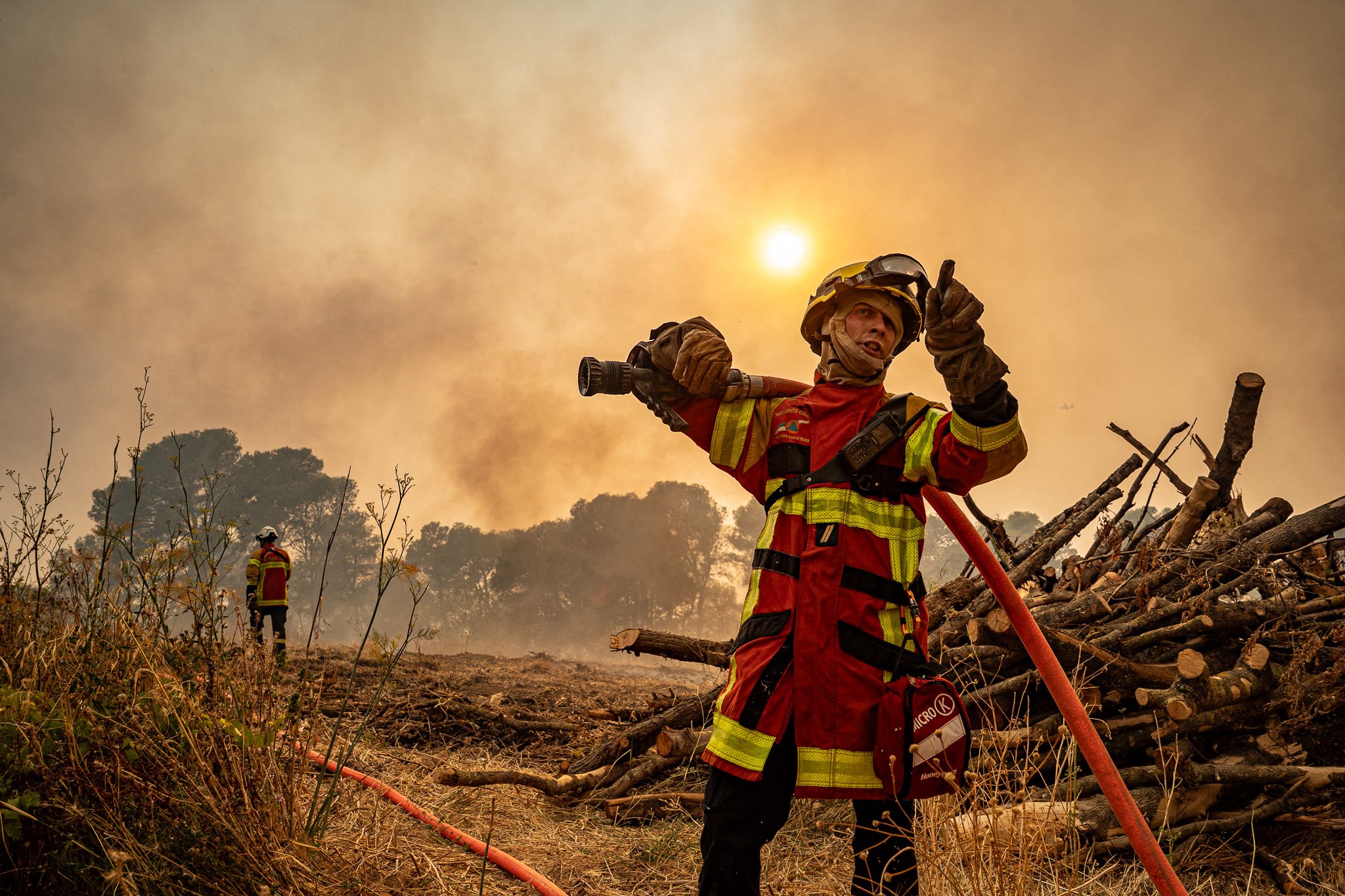
Wildfires have destroyed an area the size of Paris
AFP
“It was a fire of extreme violence. There were a lot of dry trees. In all my years as a fireman I’ve never known a fire to move so quickly and with such explosive power,” said Dubois as Armelle, his wife, stood to one side, clutching her mobile after being put on hold by their insurers.
Eventually, as she wiped tears from her eyes, a voice came over the phone’s speaker: “Don’t worry Madame Dubois, you can sleep peacefully tonight, everything will be all right.”
What will be far harder to replace than stone and timber, though, is the wine business they had invested years of hard work in.
Their four-acre vineyard was planted a century ago and has been in Armelle’s family for generations. Until 2021 the land was rented out to a local co-operative and the grapes used in a local blend, but the the family decided to move upmarket and in 2022 they launched their flagship white wine, C1617, made with a rare Carignan Blanc grape found in only a few scattered “parcels” across the region.
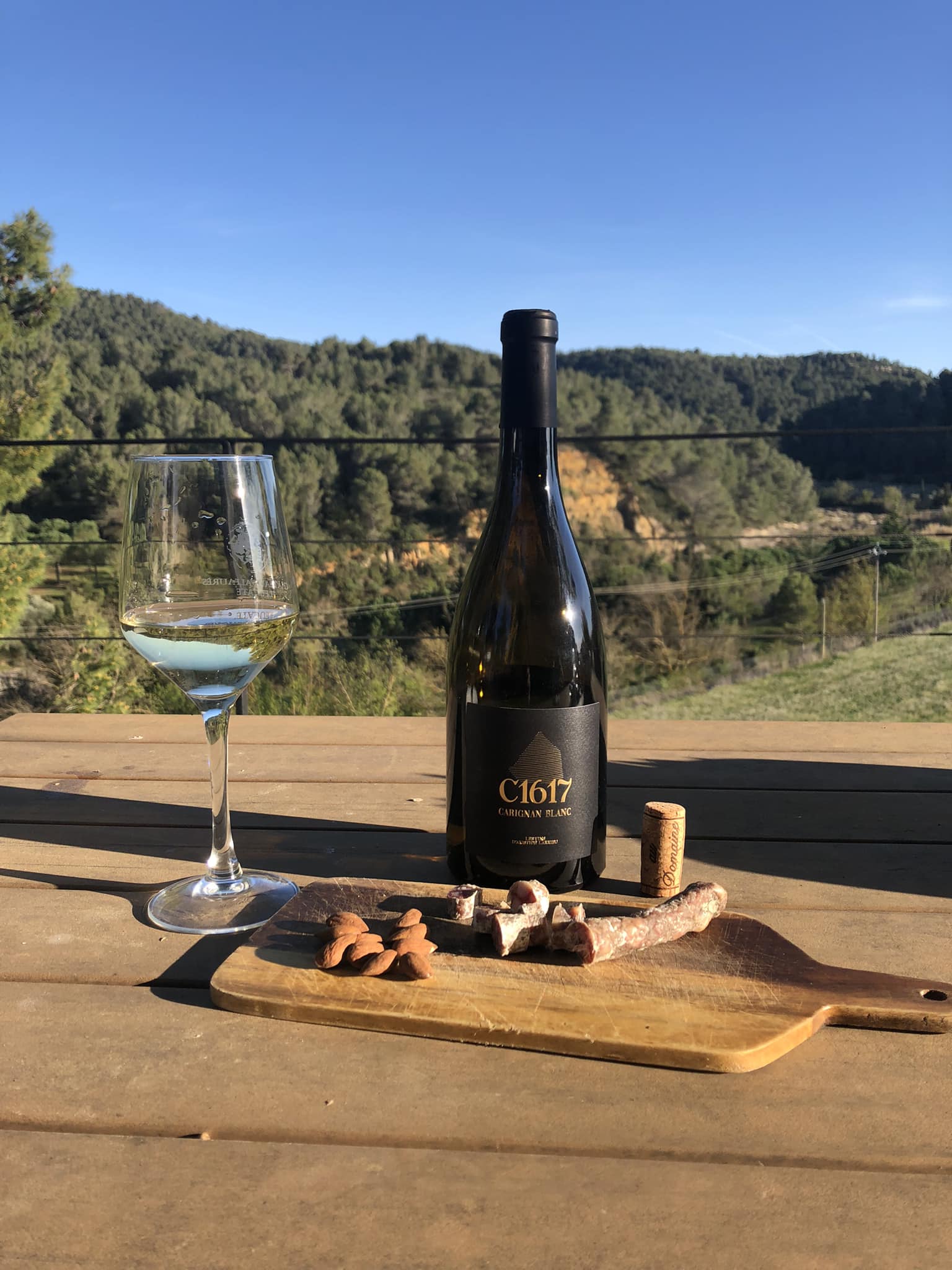
The Dubois’s best white wine sold for £130 in a local Michelin-starred restaurant …
FACEBOOK/LES VINS D’ARISTIDE LARRIEU
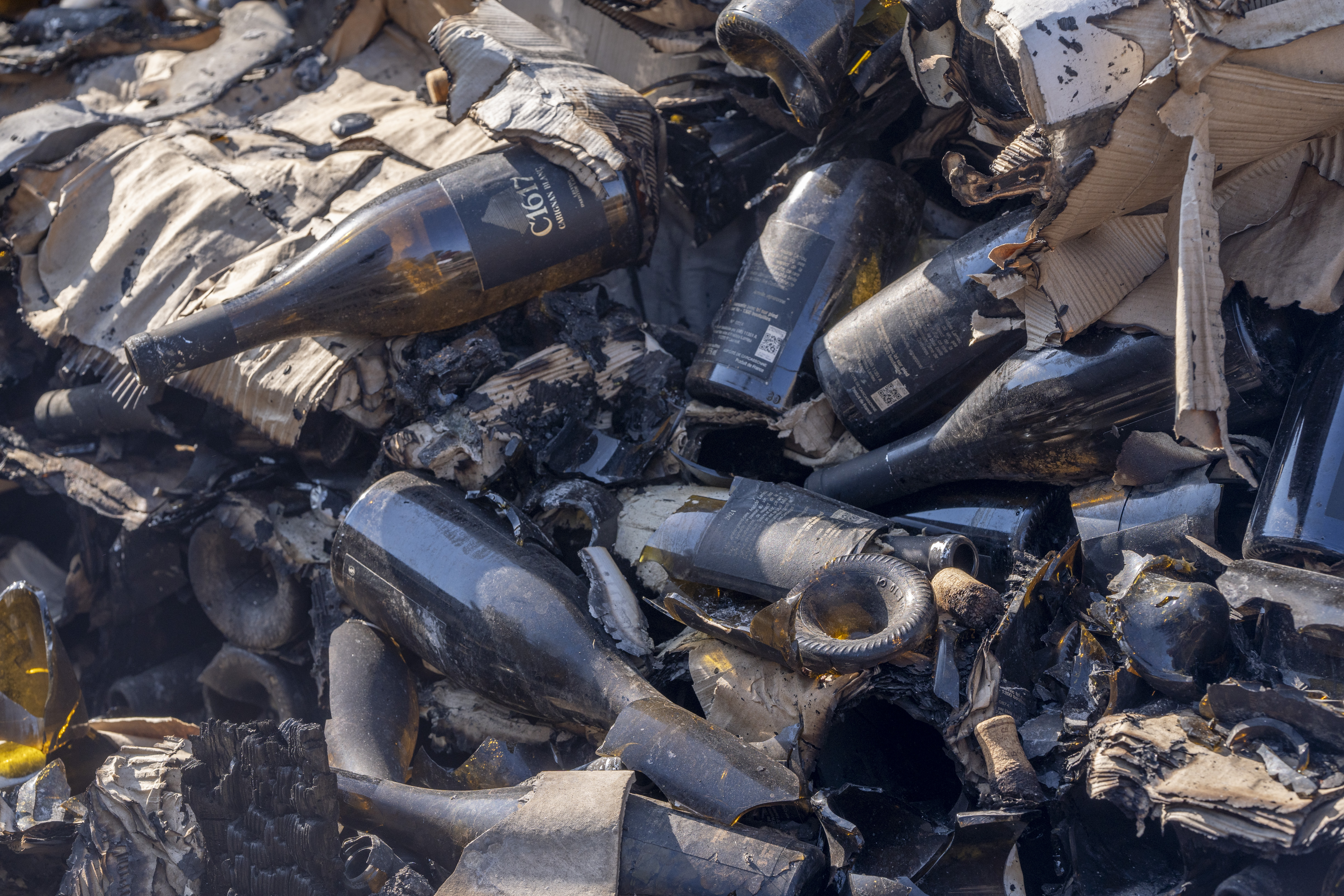
… now more than a thousand flame-cracked bottles of the vintage lie amid the rubble
NATHAN LAINE FOR THE SUNDAY TIMES
The wine, which Dubois describes as “well-rounded, supple and rich”, did well, and became a bestseller at L’Auberge du Vieux Puits, a Michelin three-star restaurant in the nearby village of Fontjoncouse that survived the fire but whose chef, Gilles Goujon, lost part of his house to the flames.
Now Dubois worries that even the grapes that escaped the flames will have absorbed some of the smoke, which would render them unusable.
He took me to see the remains of the wine storeroom, now a jumble of rubble, roof tiles and shattered bottles. Bending down to pull out one from the remnants of racks, he hoped it might be intact — but the cork had popped and the wine had vapourised. One of the bottles he held up had melted into what looked like a modernist glass sculpture.
The night before I had watched the flames flare again opposite the house of Franck Lhermet, 60, a vehicle glass repairman. “My wife and I have put all of our most important belongings, our passports and other documents, into the car, ready to go,” he said as ash swirled around us in the heat like snowflakes.
Every so often a sharp crackle split the air as another pine tree went up, its cones detonating like grenades to hurl showers of cinders into the wind, scattering sparks across the dry ground.
“The person who did this must feel very proud,” said Lhermet, his voice heavy with irony. An investigation has been launched into the cause of the blaze, believed to have begun on the edge of a small country road, most likely from a cigarette butt flicked out of a passing car’s window.
It later emerged that a man was arrested on Thursday after being caught attempting to start a fire in a forest northeast of the main conflagration. Police are trying to determine if he is the culprit.
Across the region, people were picking through what the fire had left behind. In the isolated village of Jonquières (population: 45), half a dozen houses had been left blackened by the flames, their barns and outbuildings demolished. The sound of hammers and the murmur of voices mingled with the acrid scent of burnt earth. A huddle of firemen rested under the shade of a giant plane tree dominating the tiny main square.
“There’s a lot of trauma here,” said Cécile Arribat, a psychologist who was approaching passers-by to offer counselling.
• South of France wildfires: is it safe to travel right now?
Annabelle Piraud, 55, a daughter of the local mayor, described how the flames had swept up the hill with startling velocity. “I was watching a wall of flame come closer and closer to us and thinking ‘how can it move so fast?’” she said. “We realised we had to get everyone out, so I helped gather some of the elderly and we left — just in time.”
She did not have a chance to free her horse and two donkeys from their enclosure but luckily they survived, unlike a neighbour’s 70 sheep, “carbonised” in their field.
On some parts of the hill, plumes of smoke could be seen emerging from the ground. Helicopters thudded back and forth, each swinging a red “Bambi bucket” beneath its belly to dump arcs of fire retardant onto the slopes.
Dubois, the vigneron fireman, believed it could take several days, if not weeks, to put out the fire completely, as it can smoulder in the ground, hidden in roots and peat, only to flare back to life when fanned by wind or fed by the heat.
As we spoke, three of his firemen colleagues took advantage of a lull to drop by and offer their commiseration for his lost vines. Half an hour later, another pair turned up to check on him. “There’s a lot of solidarity here,” said Dubois. “We all look out for each other.”
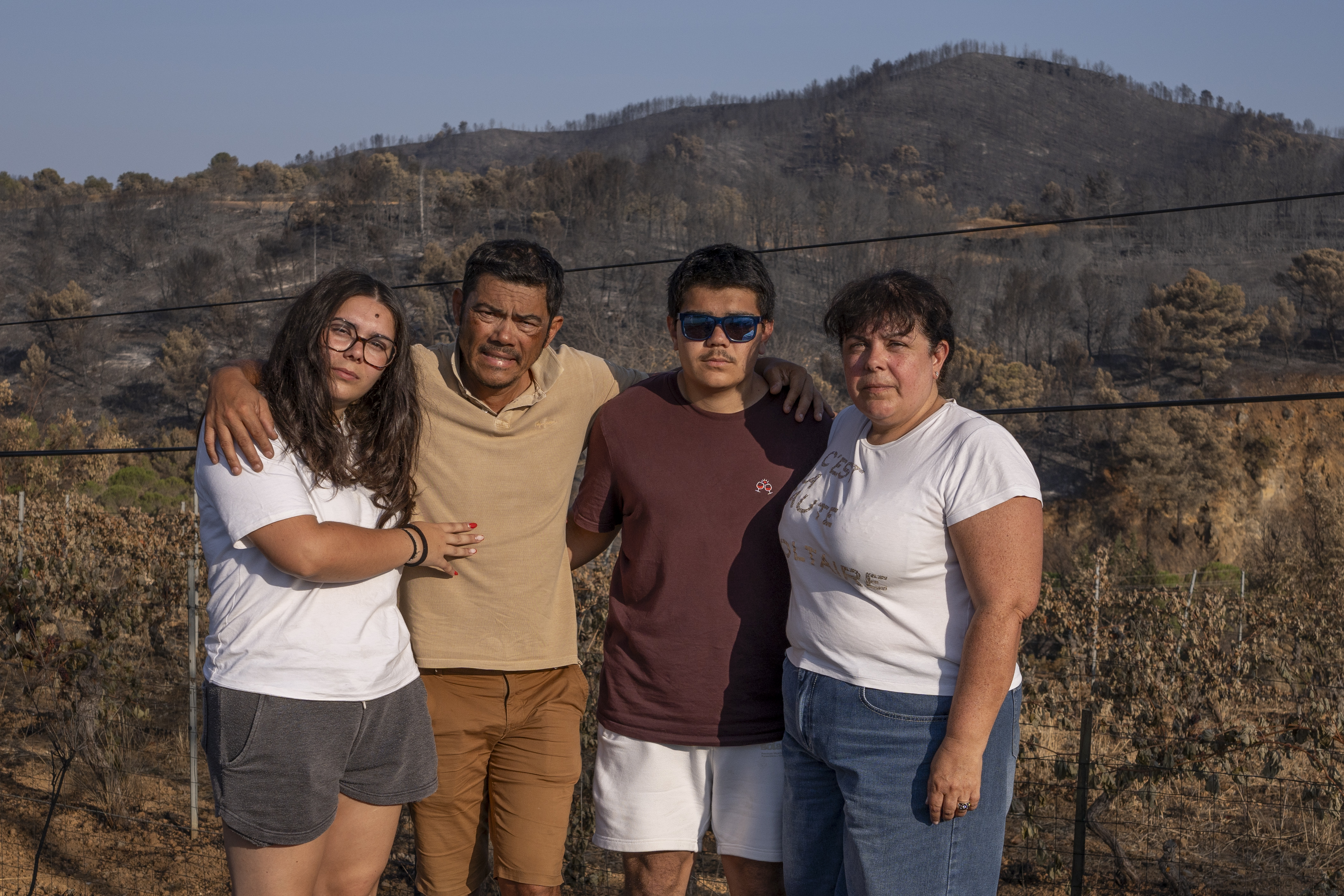
The Dubois family — from left, Carla, Jean-Marie, Julien and Armelle — invested years of hard work in their vineyard
NATHAN LAINE
He recalled happier times, when the family would invite all their friends to help with the September harvest. “It’s great fun, we’d have a lovely dinner in the evening on the terrace with that breathtaking view of the valley.”
So will they do the same next month, harvesting the batch of grapes that survived? Dubois thinks there could be enough to make at least 800 bottles of C1617. It sells for £15 a bottle — and for £130 in the three-star restaurant. “People would drink it there and then come here to buy directly from me,” said Dubois.
As for whether he will resume his oenological adventure, he said: “You certainly don’t want to taste smoke in your wine.” His wife is not optimistic about the grapes being any good after coming so close to being incinerated.
But Dubois, who describes himself as “hyperactive” — and who learnt the craft of winemaking by consulting experts, as well as on internet sites — thinks he can persuade her. “From great disasters and problems come opportunities,” he said. “I’m an optimist.”

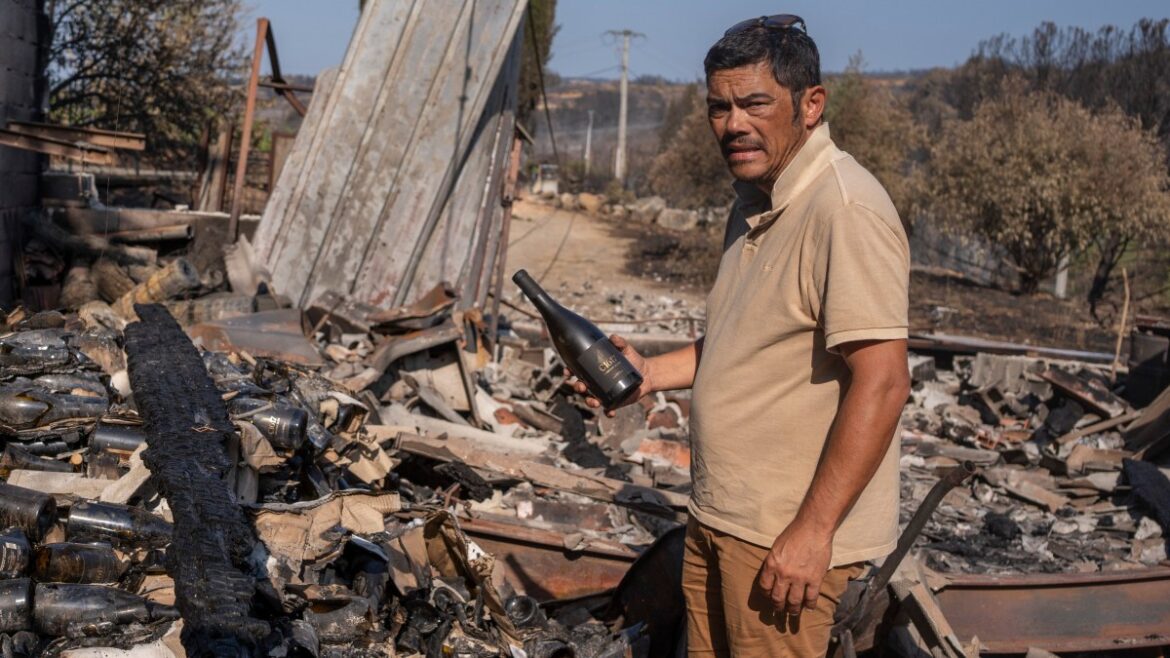
Dining and Cooking